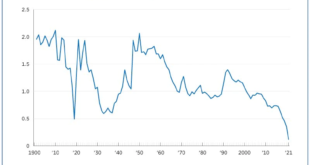by David Zetland (originally published at The one handed economist) I had heard of Douglass, but man oh man, I had no idea of his brilliance. His “Composite Nation” speech is full of wisdom and hope, offering a path to that “shining city on a hill” that Americans have had such a hard time reaching — mostly due to a desire to preserve “tradition” over “progress.” (Listen to this Malcolm Gladwell episode on a segregationist in the 1970s — a...
Read More »Our success or failure in life may be influenced by where we’re born
Economist David Zetland lets us know our place of birth has a much larger impact on our success or failure globally than what we suspect. It is not solely up to us to be successful. The country of our birth has a great impact. The understanding of our luck to be where we are globally impacts our view of people’s success who our born into other countries. “Born (un)lucky?” The one-handed economist, David Zetland I was born an American and...
Read More »Letters from an American, December 18, 2022
I have not C & Ped enough of these recitals of present-day history in the making for AB readers to keep up with the House Committee meeting as recited by Prof. Heather. An in-committee vote will be taken to confirm whether a recommendation to prosecute former president trump will be made to the DOJ. My guess is the vote to do so will be unanimous. The committee has gone through great lengths to examine the detail leading up to the attack on...
Read More »The Anti-Racism of Fools
Peter Dorman at Econospeak The Anti-Racism of Fools Antisemitism has long been intermingled with movements against injustice and elite control. This is because the most widespread image in the mind of antisemites is the existence of a secretive cabal of Jews who control global finance and promote liberal-sounding ideas only because it serves their nefarious goals. Hatred of Jews therefore deflects radical inclinations that might otherwise...
Read More »Announcement of a Looming White Minority Makes Demographers Nervous,
“Announcement of a Looming White Minority Makes Demographers Nervous,” Sabrina Tavernise, The New York Times.” NYT’s article makes this announcement of White America becoming a minority in the 2040’s like it is new news?. It is not. In 2006, I exchanged emails with Joel Garreau about the same topic in his article “300 Million and Counting.” Joel concentrated on the arrival of immigrants to the country being good news as it keeps our labor...
Read More »“Upon Becoming an American”
I guess I am going to lose some of my writer reputation now as I look at the aspect of how certain “legal” migrants in San Antonio, Texas were treated by the governor in Florida. These people did not sneak into the US. They were granted asylum after presenting themselves to border guards, registered in the system, and released to a shelter. In turn they were scammed by a representative sent by Florida’s Governor DeSantis to go to Massachusetts where...
Read More »On the centrality of mass migrations to human history
“For Indigenous Peoples’ Day: on the centrality of mass migrations to human history“ – by New Deal democrat I just finished reading Susan Wise Bauer’s “The History of the Ancient World,” which in a little under 800 pages summarizes an almost endless string of kings and battles from the earliest written records kept by the Sumerians around 3000 BC through the accession of Constantine as Roman Emperor in 306 AD. It is timely to consider it...
Read More »DeSantis’s Sales Pitch to “legal” Venezuelan Immigrants to get them on the Planes
The Martha Vineyard pamphlet given to legal Venezuelan immigrants in the US. Florida (as if you did not know where he rules!) Governor DeSantis’s motive was to convince the immigrants to get on the plane in Texas (a suburb of Florida) to go to paradise another city where they could get jobs, cash for eight months, vocational skill training, etc. They were not told the location of this paradise. “Just hop on the bus, we don’t need to discuss much....
Read More »Combating Nativism and Making America Stronger
Combat Nativism and Make America the Most Welcoming Country in the World Some findings from the Roosevelt Institute: “New report: Combat Nativism and Make America the Most Welcoming Country in the World” – Roosevelt Institute In 2020, natural disasters forced more than 30 million people to migrate across the globe. by 2050, climate change impacts could bring this number up to 216 million.Mass migration is happening against the global backdrop...
Read More »At Hand
In each of the coming years, we will see more floods destroy billions upon billions of dollars worth of property, crops, and infrastructure, and take hundreds of lives; more frequent, more deadly, tornadoes and hurricanes that will do the same; an increasing lack of water for crops cause food shortages and higher food prices, which will lead to more people going hungry, starving. Before long, in America, we will begin to see the lack of water cause...
Read More » Heterodox
Heterodox


